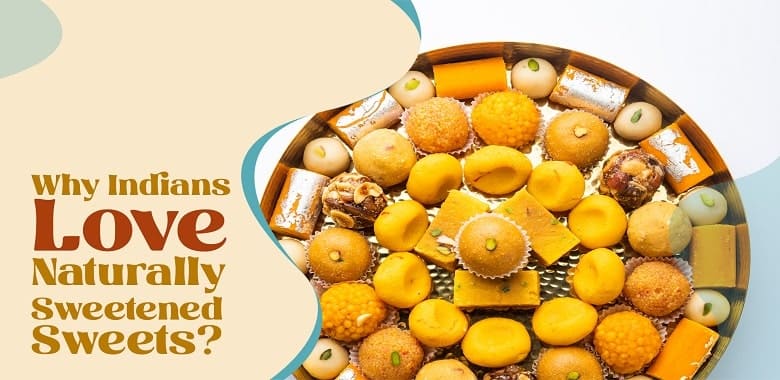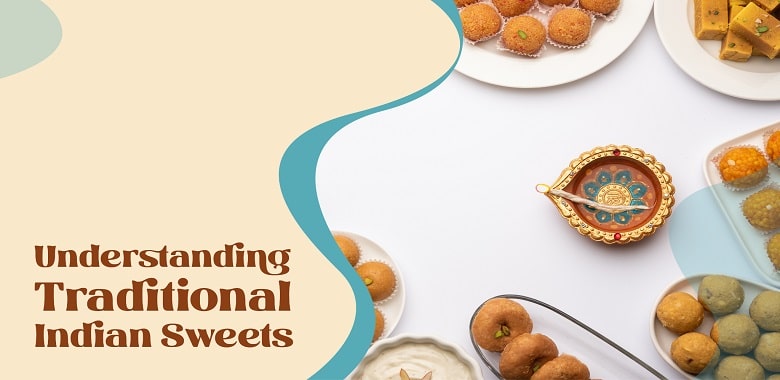Divided by states but united by our love for sweets. This is what sums up Indian culture. We Indians have had a long love affair with Indian sweets. And it ain’t dying down any time soon.
From Lassi to Kulfi, from barfis to ladoos, Indian sweets have a little something for everyone. There are dozens of Indian sweets that make us drool just thinking about them. Desi mithai’s are our absolute favorites since they are dripping with ghee and packed with sugar or khoya.
But what if you could enjoy your favorite sweets that are naturally sweetened and don’t harm your health in any way? It sounds delightful, doesn’t it?
Made of Milk is back again with a banger blog where we are helping you explore the naturally sweetened Indian sweets.

Why Indians Love Naturally Sweetened Sweets?
We invest great emphasis on maintaining our health, just like everyone else. We Indians prefer naturally sweetened sweets due to the health benefits they have because of their nutritional value, ayurvedic principles, lower glycemic index, digestive benefits, and cultural significance. The natural sweetener contains ingredients like jaggery, honey, and dates, which provide trace minerals, antioxidants, and other beneficial compounds.
Ayurvedic principles promote the use of natural ingredients, while natural sweeteners like jaggery are considered healthier. These sweets also have a lower glycemic index, making them suitable for individuals with diabetes or those concerned about sugar intake.

Health Benefits of Natural Sweeteners Over Refined Sugar
Natural sweeteners are considered healthier than conventional sugar because these sweeteners usually contain more vitamins, minerals, antioxidants and other bioactive molecules that may be healthful. Let’s get a deeper insight on some health benefits of natural sweeteners over refined sugar:
- Nutritious value: Natural sweeteners like honey, maple syrup, and coconut sugar contain small amounts of vitamins, minerals, and antioxidants. While these nutrients may not be present in large quantities, they provide some additional nutritional value compared to refined sugar, which lacks any significant nutrients.
- Lower glycemic index: Many natural sweeteners have a lower glycemic index than refined sugar. This is particularly beneficial for individuals with diabetes or those aiming to manage their blood sugar levels.
- Less calories consumed: Stevia and monk fruit extract, two natural sweeteners, can give sweetness with little or no calories. People trying to cut back on calories or control their weight may find this helpful.
- Milder impact on insulin levels: When compared to refined sugar, natural sweeteners frequently have a milder effect on insulin levels. This may contribute to more consistent energy levels and lower the chance of insulin peaks and crashes.

Understanding the Health Risks associated with Refined Sugar Consumption
Consuming meals and beverages that are often high in refined sugar might raise your risk of becoming obese since they are calorie-dense and deficient in important nutrients. This may result in weight gain and other health problems.
Additionally, refined sugar raises blood sugar levels quickly, which over time can lead to insulin resistance, a risk factor for type 2 diabetes. Additionally, it might damage your teeth, causing cavities and tooth rot. Furthermore, due to inflammation and metabolic abnormalities, a diet heavy in refined sugar has been linked to chronic illnesses including heart disease, high blood pressure, and several malignancies.
Another issue is nutritional deficits since refined sugar has empty calories and can replace meals that are high in nutrients, which can harm general health and weaken the immune system.
Additionally, consuming a lot of sugar can have an impact on mental health, causing melancholy, anxiety, and mood swings. Consequently, it’s crucial to be aware of how much refined sugar you consume and choose healthier options.

Understanding Traditional Indian Sweets
Sweets are a fundamental component of the social, religious, and cultural context in India. The customary mithai are a necessity for any event. In actuality, each god has a preferred sweet treat. Some of these sweets date back hundreds of years and come with pretty fascinating backstories.
Let’s delve into the interesting world of mithai, or traditional Indian sweets! The food and culture of India are not complete without these wonderful delights. Each sweet has a distinct flavor and texture and is made with the components including milk, ghee, sugar, almonds, and fragrant spices. The preparation techniques include roasting or frying the ingredients to heat the milk and decreasing it.
Regional varieties are common with South Indian treats like Mysore Pak and Jangri boasting rich and syrupy consistencies, while Bengali treats like Rasgulla and Sandesh are famed for their smooth, creamy texture. Traditional Indian sweets are exchanged at festivals and served as prasad during religious ceremonies as a way to express gratitude and community. These delicacies are cultural symbols that are more than just sweet treats.
These treats are cultural symbols of hospitality and good fortune, in addition to being culinary delights. Gulab jamun, jalebi, barfi, laddu, and peda are a few of the most commonly eaten Indian sweets.
Conclusion
Indian culture is deeply rooted in the love for sweets, but it’s crucial to be mindful of our health. The shift towards naturally sweetened Indian sweets is gaining popularity, offering delectable flavors and health benefits. Natural sweeteners like jaggery, honey, and dates provide trace minerals, antioxidants, and other beneficial compounds.
They have a lower glycemic index, making them suitable for individuals with diabetes or those concerned about sugar intake. These sweeteners are less processed and contain fewer calories compared to refined sugar.
By embracing the healthier side of traditional Indian sweets, moderation is the key, and consulting with healthcare professionals or registered dietitians can provide personalized guidance on managing sugar intake and making nutritious choices.





